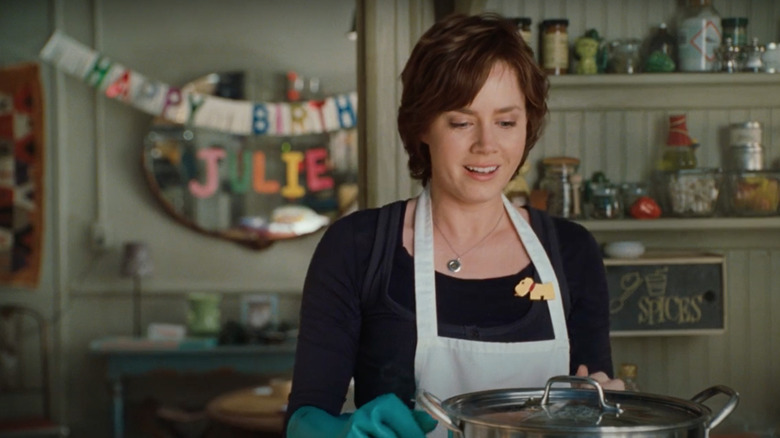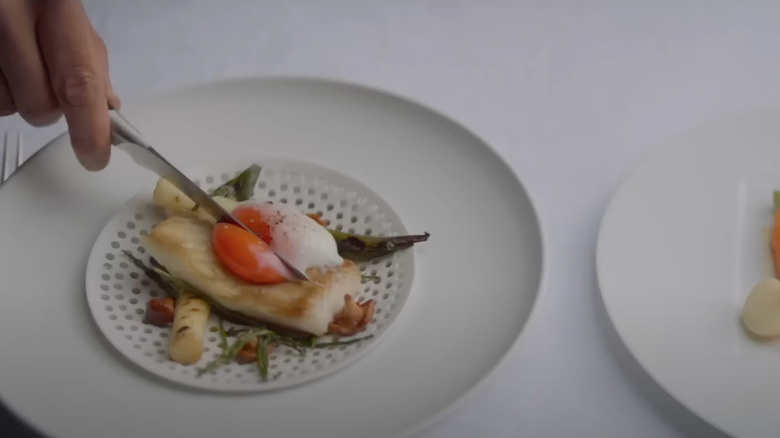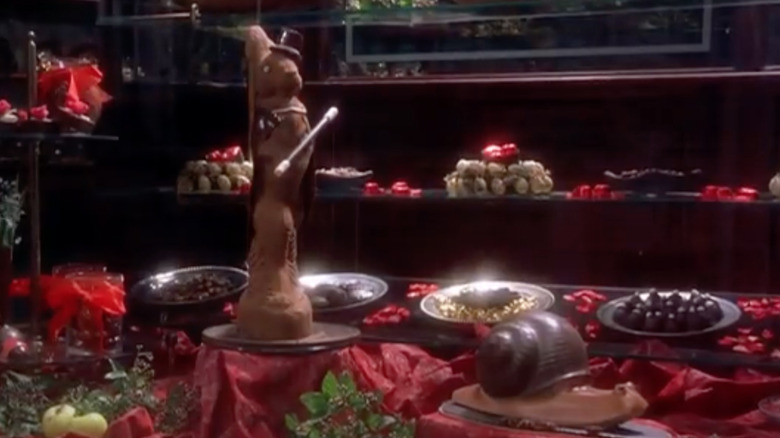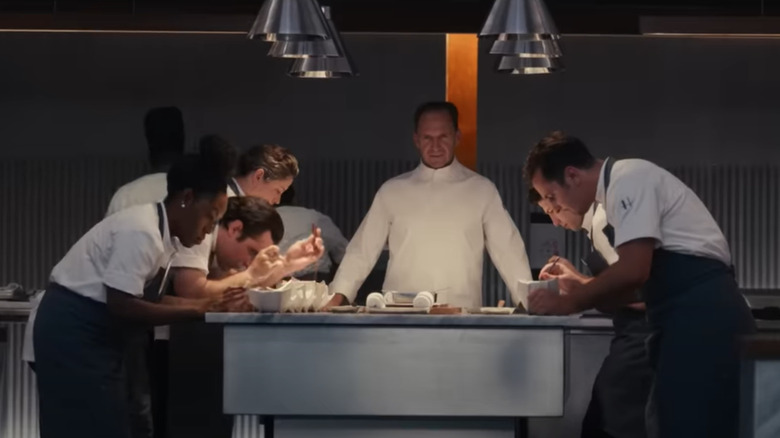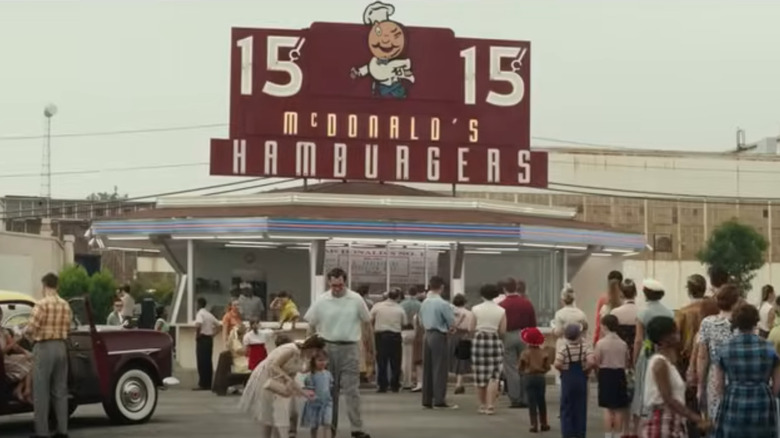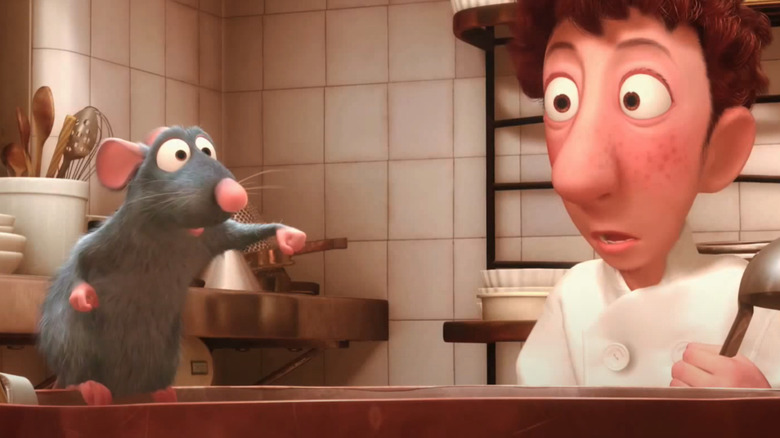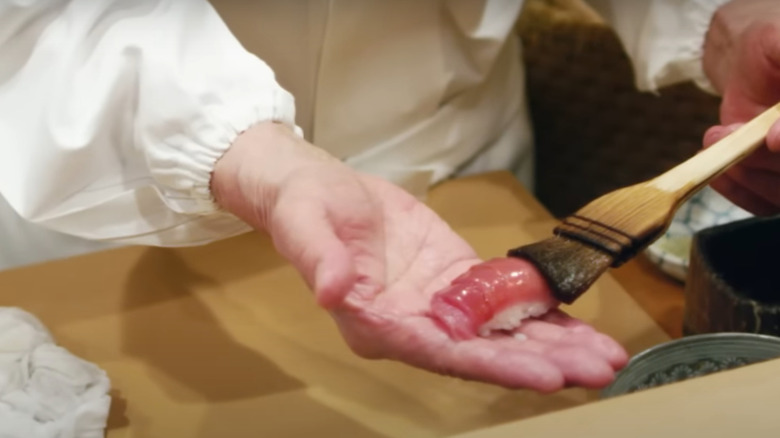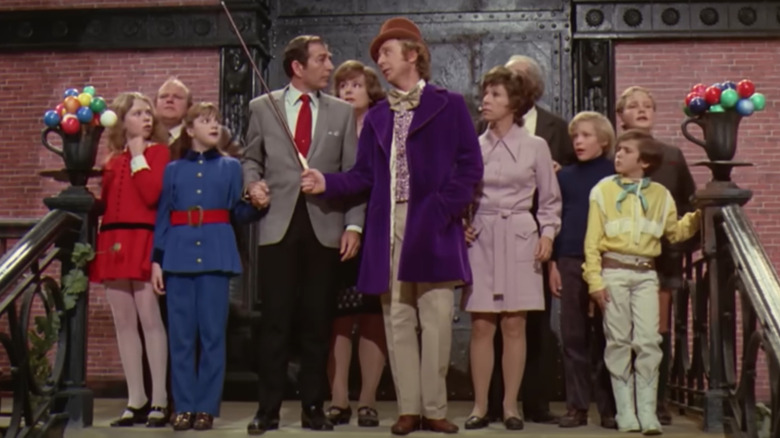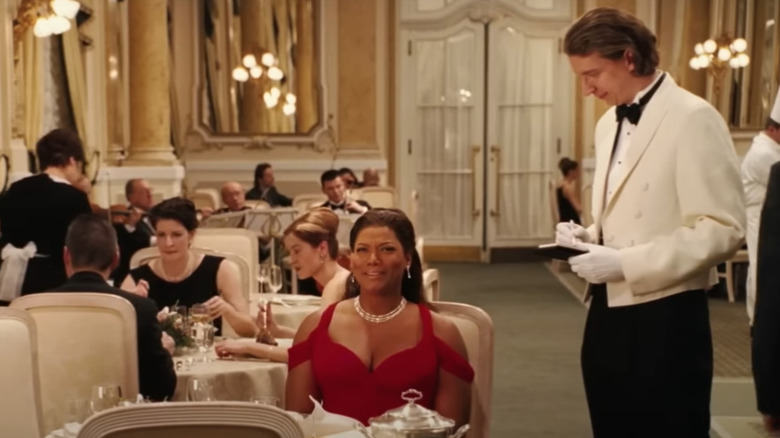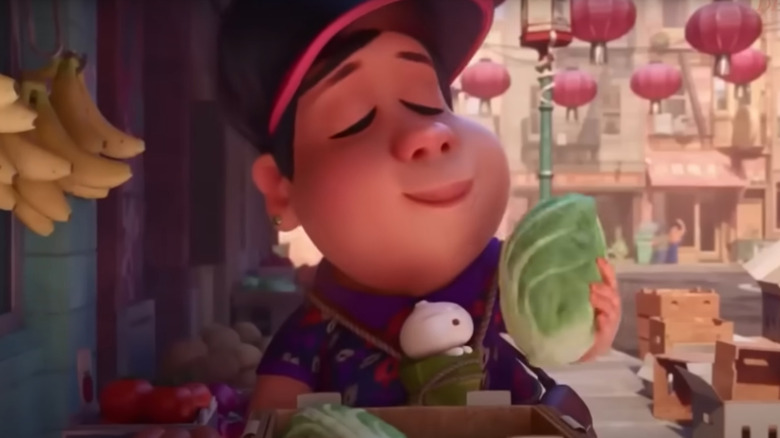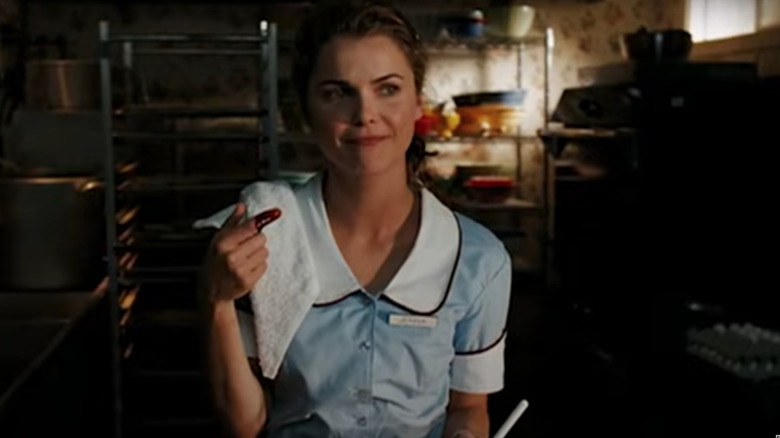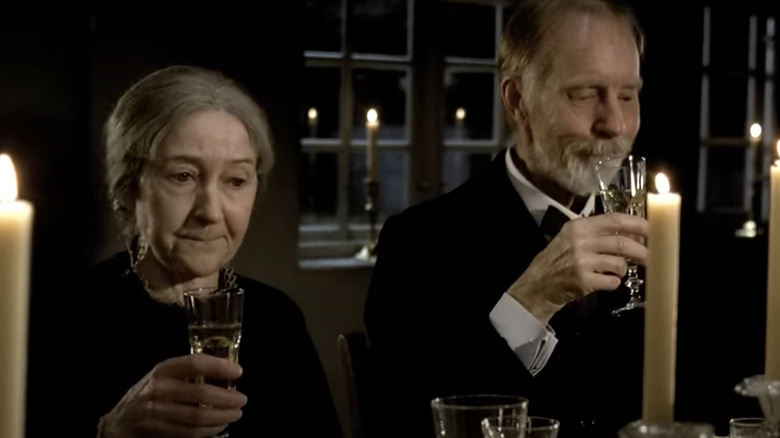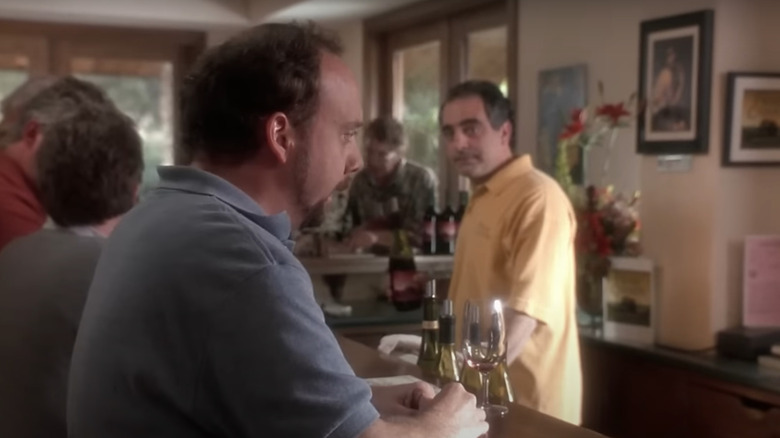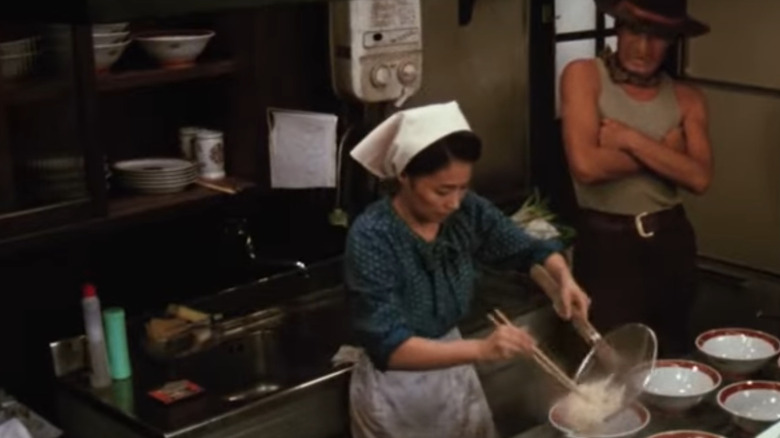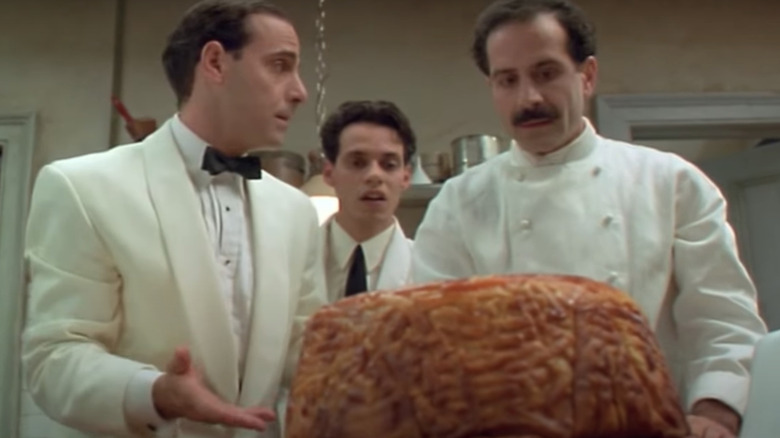16 Must-Watch Movies For Foodies
Movies and food go hand-in-hand. After all, what is a trip to the movie theater without a gigantic bucket of buttery popcorn to go along with it? A childhood sleepover, complete with movies and slices of takeout pizza? Alongside consuming actual food in front of the silver screen, there have long been movies created about, celebrating, or otherwise depicting food. Food as a metaphor, food as a plot device, or food as a background character within all the action.
But what makes a movie a must-watch for foodies? While certain films have standout moments centered around food, we think to be a true foodie movie, there has to be love there. Food has to fuel our characters in one way or another, even if it's not always at the forefront. Rendered in loving detail, we dined out on these films, vicariously imagining ourselves indulging in the dishes that beg to be brought to life.
Chef, 2014
This is perhaps a personal bias of this writer, but "Chef" may be one of the best food-related movies ever. The 2014 film written, directed, and starred in by Jon Favreau tells the story of chef Carl Casper, a fine dining chef who has become jaded by his position in a fine dining restaurant where his creativity is stunted under the ownership of an unimaginative boss, played by Dustin Hoffman. Casper quits the restaurant and later rediscovers what he wants to do through a food truck that focuses on Cuban sandwiches.
The movie relied on the expertise of chef Roy Choi who trained Favreau in everything from folding kitchen towels to slicing onions. The meticulousness shows in the finished product, which has some seriously drool-worthy moments, like the crunch of a knife slicing through a perfectly toasted grilled cheese sandwich to the deep-fried, powdered sugar goodness of authentic beignets picked up in the French Quarter of New Orleans (preferably at a food festival). If you watch this flick for movie night, we recommend having a few snacks on hand, because it will definitely make you hungry.
Julie & Julia, 2009
Meryl Streep is peak character actor in her portrayal of Julia Child in this 2009 film inspired by the blog of the late Julie Powell, played by Amy Adams. In the early 2000s, Powell sought to cook every one of Julia Child's recipes from "Mastering the Art of French Cooking" in a single year — a feat that amounted to 524 recipes in 365 days.
Directed by Nora Ephron, the film is visual comfort food at its finest. Telling two stories simultaneously, the viewer watches Powell as she attempts — and occasionally fails — to replicate the classic recipes in her New York City apartment while also getting glimpses of the past and witnessing Child as she attended Le Cordon Bleu in France in the 1950s.
The passion for food is evident in both women, and we watch as Child learns to chop onions among professional chefs and Powell break down over the burning of her boeuf bourguignon. It's a love letter to food, told by two women trying to find their way, who both end up with a book deal at the end of it all.
Burnt, 2015
Released around the same time as 2014's critically successful indie "Chef," "Burnt" had the unfortunate distinction of being forgotten in light of "Chef"'s critical adoration. It also doesn't help that, where "Chef" has heart, "Burnt" fails to give viewers much in the way of warmth and fuzziness.
However, it's a decent enough movie that takes a look at the toxic masculinity that can run rampant in professional kitchens. Bradley Cooper plays Adam Jones, a former addict with a Gordon Ramsay-esque temper who is determined to return to his former glory by opening a restaurant in London and earning the fabled Michelin star. Unlike other films that really show the homey, comforting love of food, "Burnt" views food as art — distant, beautiful, and prepared with precision. It's fine dining, certainly, but it also looks almost inedible, because you wouldn't want to disrupt the beauty. It's a story of redemption, but Cooper's Adam can be quite unlikeable at times, making it difficult to root for his success, as his old habits rear their ugly heads.
Chocolat, 2000
"Chocolat" is a sweet tooth's fever dream. The 2000 film feels almost like a fairytale, from the lilting, French-inflected narration to the cobblestone village — and, of course, the chocolate shop. The movie tells the story of a woman, Vianne (played by Juliette Binoche), and her daughter, Anouk, who move to a small French village to open a chocolate shop in 1959. The village is repressed, with everyone under the unflinching guidance of the mayor (played by Alfred Molina), but begin to loosen up with the arrival of the almost magical Vianne and her alluring chocolates.
And the chocolate is alluring. There are multiple shots of the sweet being prepared, swirled, glazed, drizzled, and decorated. From steaming mugs of thick hot chocolate to beautiful bon bons designed to look more sensuous than the French villagers are used to, the movie is one that will shake the resolve of even the staunchest sugar-avoiders.
The Menu, 2022
Food is a weapon in 2022's "The Menu," which sees the 1% get a whole lot more than they expected during a fateful dinner at Chef Slowik's restaurant. Like "Burnt," the dishes in "The Menu" are beautiful to look at. The viewer is presented with each dish much like the guests are, with the name as well as the components. It's fine dining at its peak, reaching a zenith when it comes to the explosive final course.
The horror-comedy is an excellent choice for foodies who see past the pretension that invades so much of the industry. While the elite guests ooh and ahh over Slowik's dishes, protagonist Margot (Anya Taylor-Joy) is not taken in so easily. While we love looking at the food in "The Menu," it reads more as art installation than actually edible. Like Margot — and Chef Slowik — we are only truly satiated when we can feast on the greasy, melty, classic cheeseburger served near the finale of the film.
The Founder, 2016
Speaking of cheeseburgers, if you're a fan of the golden arches, you'll definitely want to carve out some time to sink your teeth into 2016's "The Founder." A docudrama that follows the formation of McDonald's from a roadside stand with a simple menu into one of the most recognizable fast food franchises today, "The Founder" centers on Ray Kroc, played by Michael Keaton. Kroc is a milkshake salesman who stumbles upon two brothers who own and operate a hamburger stand with great success, due to a streamlined menu and a commitment to consistency.
The story follows Kroc as he becomes more and more cutthroat in his ambition to see McDonald's become a success — with or without the brothers' involvement. For foodies, it's a delicious insight into the American — and now international — institution, and how it came to be. If you like a dose of history along with your meal, "The Founder" is certainly worth a watch.
Ratatouille, 2007
A movie for the kiddos, but also for anyone who enjoys food and some comforting Disney animation, it's 2007's "Rataouille." Despite having the slight handicap of being a rat in the kitchen, few on-screen characters have ever been as passionate about food as our buddy Remy. Throughout the film, we discover not only Remy's talent for cooking as he chops, seasons, and stirs his way to culinary greatness, but also the important adage stated by Remy's (ghostly) mentor, Chef Gusteau, "Anyone can cook."
The film does an excellent job of not just depicting cooking and enjoying food, but also how food can make us feel, how it can alight the senses and create memories. They say that smell is the strongest sense tied to memory, but "Ratatouille" makes a compelling argument that taste may be just as worthy. Want further proof to add this foodie film to your must-watch list? It has Anthony Bourdain's seal of approval.
Jiro Dreams of Sushi, 2011
There are plenty of documentaries about food, many of them focused on revealing the icky inner workings of the commercial food industry. 2011's "Jiro Dreams of Sushi" is decidedly not that. Instead, it takes an intimate look at the construction and plating of sushi, as hands delicately lay perfectly sliced fish atop carefully mounded rice.
The subject of the award-winning doc is master sushi chef Jiro Ono, the now nearly-100-year-old owner of Sukiyabashi Jiro in Tokyo. The 10-seat restaurant is located in a Tokyo subway station and, despite its unassuming appearance, once boasted three Michelin stars. The quality of the restaurant still remains, but the Michelin guide removed the stars, since guests cannot directly make a reservation. One of the key conflicts at the heart of "Jiro Dreams of Sushi" is Jiro Ono's worry of allowing his son to take over the restaurant. In 2023, upon Ono's retirement, his son Yoshikazu Ono ended up doing so.
Willy Wonka and the Chocolate Factory, 1971
No, not the sterile Johnny Depp version with the bad wig. True foodies know that the original "Willy Wonka and the Chocolate Factory" from 1971 is the superior film about sweets. Kaleidoscopic in color, intense in its storytelling, and with a Wonka who is more than a bit of a jerk, the fantastical film shifts from a dreary-hued, depressing tale about poverty and class into a vibrant odyssey with more than a few delicious sweets.
The scene with the chocolate river (and poor Augustus Gloop)? Iconic. Gene Wilder biting into a yellow teacup that looks a bit like wax but also kind of yummy? Mesmerizing. Has there ever been a movie where licking wallpaper not only looked like a good idea, but like something that might taste delicious, too? Offering us insight into the transformative power of sweets — how else did a mere chocolate bar cause Grandpa Joe to spring from his bed? — "Willy Wonka and the Chocolate Factory" is A+ foodie material.
Last Holiday, 2006
"Last Holiday" has the fun distinction of being a bit of a Christmas movie and a bit of a foodie movie, although it might not be the first to spring to mind when you think of either category. Queen Latifah plays Georgia Byrd, a retail worker at a department store who lives her life safely — and boringly. She cooks lavish meals for her neighbor while microwaving frozen dinners for herself and pining for LL Cool J.
Then, she receives word that she has a terminal illness and decides that the time for playing it safe is over. She uses her money to fund a lavish trip to her dream hotel and viewers get the chance to live vicariously as Georgia travels first class, upgrades to the presidential suite, and orders every single thing on the hotel's menu. No more Lean Cuisines for her! She spends her time eating, drinking, and being merry in the days leading up to New Year's Eve, finally realizing that the secret to life is not just "butter," as per Chef Didier's suggestion, but actually living it.
Bao, 2018
The only short film on our list earns its spot because it's weird, unforgettable, and features some really delicious cooking scenes in its short eight-minute runtime. With no dialogue throughout, "Bao" introduces us to a woman who is making dumplings at home only for one doughy creation to suddenly spring to life.
We follow the woman and her dumpling son as he grows from a baby bao to an independent adult. The woman is loath to let him go and — in a twist that shocked many viewers — eats him. Of course, the bao baby was a dream, a stand-in for her real life son who has moved out of the family home, and the film is a commentary on the complicated dynamics between parents and children. Directed by Domee Shi (who used her own mother's input for the dumpling-making scenes), the film is delicious-looking, from the pair sharing custard buns on the bus to the feast the mother cooks for her bao son. The short film stays with you, much in the way a delicious soup dumpling would have you thinking about it long after it's been devoured.
Waitress, 2007
If you have a sweet tooth, you'll want to make time to watch "Waitress," a small indie film written and directed by the late Adrienne Shelly. Jenna, played by Keri Russell, is an unhappily married (and unhappily pregnant) waitress at Joe's Pie Diner in the South with an aptitude for pie-baking. In addition to the ingredients, she also channels her feelings into the pies themselves, giving them names like "I Hate My Husband Pie" and "Bad Baby Pie" (the latter of which was technically a quiche).
Alongside some pretty delicious scenes about the kind of down-home American pies you can only get at a roadside diner (think vanilla custard and "peachy keen" tarts), viewers are treated to a story about a woman who learns that, just as she can craft pies, she can also craft something new for herself — a new life. It's a happy ending for Jenna, and a happy ending for viewers, too: "Waitress" became the little movie that could, and later spawned a stage musical.
Babette's Feast, 1987
While other films on this list have centered around food throughout, a background character alongside whatever protagonist we're watching, the 1985 Danish film "Babette's Feast" is at first defined by the lack of food. Taking place in 19th-century Denmark, the eponymous Babette flees violent France and is taken in by two pious sisters, whose steady diet of bland food (bread soup, anyone?) doesn't bode well for foodie viewers.
As the years pass, Babette becomes chef to the sisters and later, decides to cook an enormous feast for them and the people they live with. Elaborate dishes unknown to the diners are laid across the table: turtle soup, Champagne, blinis with caviar, quail stuffed with foie gras, and rum sponge cake. The feast lovingly displays not only the food, but also how it can transform us. We learn that Babette's life prior to her fleeing to Denmark had her working as chef, and the care and love for her craft is evident in the way she shares it.
Sideways, 2004
Unlike the other films on this list, "Sideways" from 2004 features very little food at all, despite the many scenes taking place in restaurants. The road trip film follows a struggling novelist (played by Paul Giamatti) as he joins his friend (Thomas Haden Church) on a trip across Napa Valley's wine country for the latter's bachelor party. Along the way, viewers are treated to plenty of scenes of wine drinking, with all the swilling, swishing, and spitting intact, but the foodie film leaves you wishing there were some cheese and crackers to help soak up all that alcohol.
It's a funny flick in the quiet indie way as we see Giamatti's Miles transformation from crotchety wine snob to slightly more optimistic wine snob as he finds himself falling in love with Maya, played by Virginia Madsen. As we learn about wine — specifically, about pricey pinot noir, Miles's favorite — we see it as a metaphor for relationships, and the care, attention, and thought required to make them bloom.
Tampopo, 1985
If you're a bit of a film buff (as well as a foodie), you may be familiar with the term "spaghetti Western." The phrase describes a sub-genre of Western films in the 1960s that were largely directed by Italians, like Sergio Leone. "Tampopo," a comedic Japanese film from 1985, became known as a "ramen Western."
The movie follows the titular Tampopo as she tries to become a master in the art of noodle-making. A few iconic scenes include an etiquette class learning to eat spaghetti silently, a pair of lovers spicing things up in the bedroom by passing a raw egg yolk back and forth with their mouths, and a "ramen master" teaching a man — and the viewer — how to appreciate traditional ramen. The film is told in a series of vignettes, with plenty of slapstick moments, while also satirizing classic American film tropes.
Big Night, 1996
Stanley Tucci has gone on to make a pretty big name for himself in the foodie scene, winning two Emmy awards for his own food and travel show and writing four books on gastronomy in various forms. Back in 1996, however, we were watching him co-direct, co-write, and star in "Big Night," a movie that follows two Italian immigrant brothers at work in a New Jersey restaurant in the 1950s. The restaurant is struggling, in part due to a competitor restaurant just across that street, which is thriving despite its mediocre food, while the brothers (Tucci and Tony Shaloub) are creating incredible dishes.
To combat the failing business, the brothers decide to have one "big night" where jazz singer Louis Prima will visit the restaurant and they will cook up a gigantic feast. The pièce de résistance for the meal is the timpano, a glorious mound of a baked pasta dish. The movie accurately represents the agonies and ecstasies of working in a restaurant, especially one that is so tied to your heart and soul. Watching the brothers fight and come together is as satisfying as digging into that luscious timpano.


